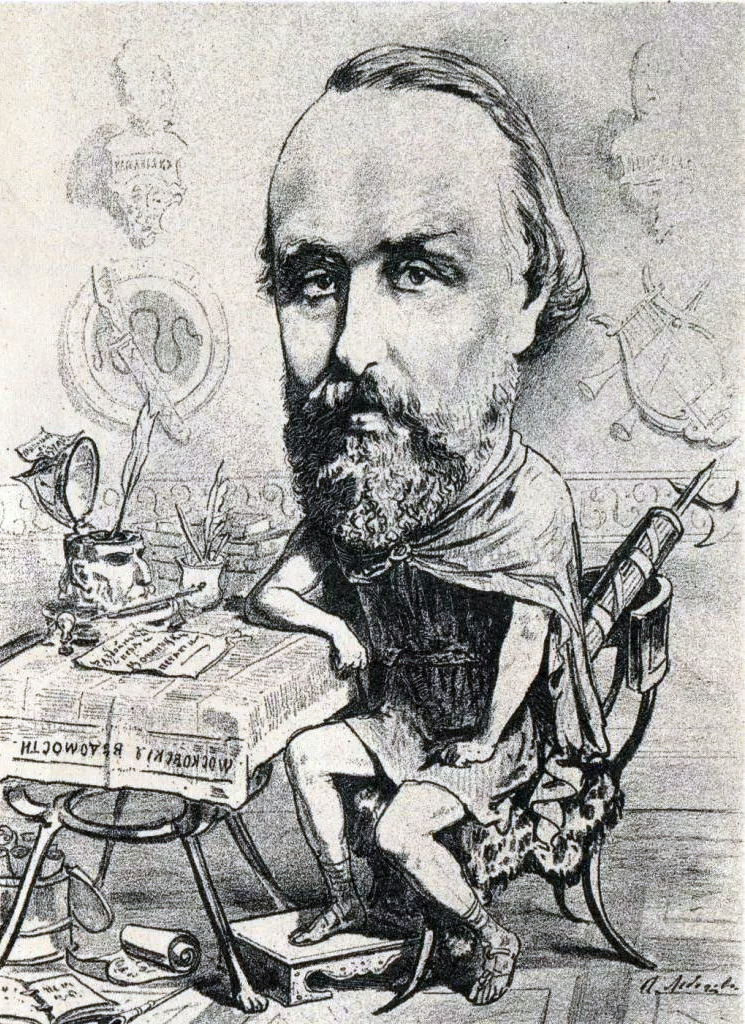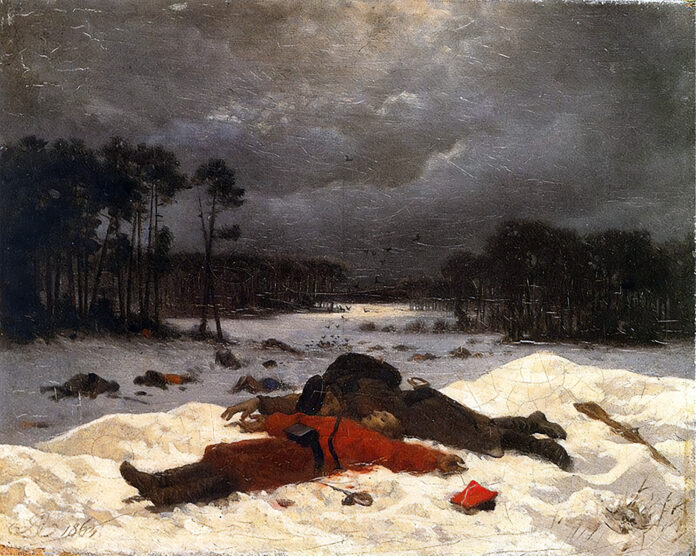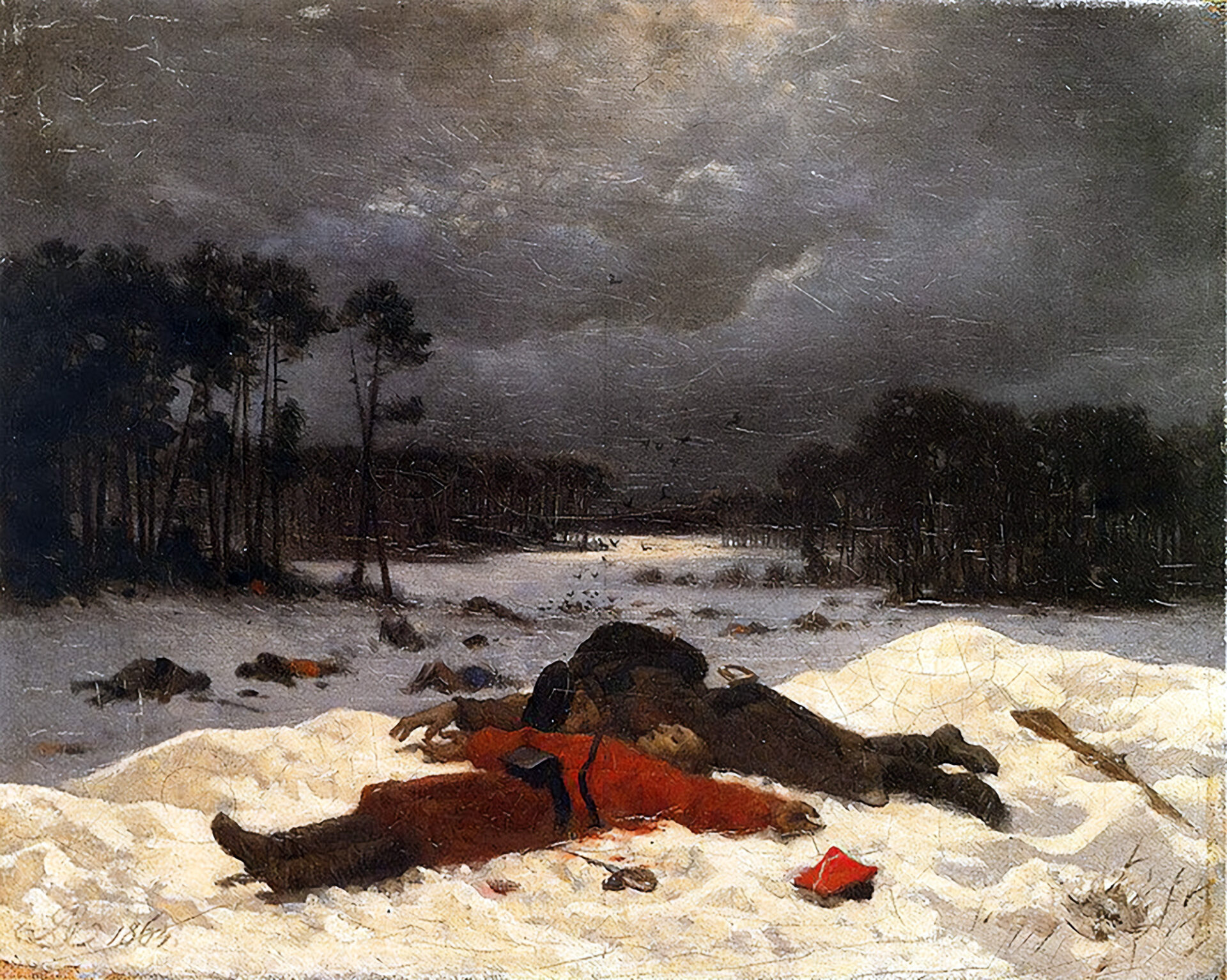Union sacrée: united patriotic front of all parties formed at the beginning of the first World War.
The historian Françoise Thom reminds us that the theme of the Union sacrée has already been exploited in Russian history. Today, the call of the regime’s propagandists for a holy alliance against the West has not had real success because Russia is the aggressor and not the aggressed. The Slavophile mythology that elaborated the idea of a plot of “degenerate” Europe against Russia as the guardian of “traditional values” does not mobilize the masses.
The Russian autocracy has always been aware of its underlying fragility stemming from the Russians’ perception of power, a perception that goes back to the 14th century when the Muscovite princes were the collectors of the Mongolian Khan and extended their domination by collaborating with the invader. Power was then experienced by Muscovites as an external occupying force against which nothing could be done, but from which one had to protect oneself as much as possible. Far from fading with the centuries, this notion took root among the Russians due to the extension of serfdom during the period of the first Romanovs. Horrific peasant uprisings periodically reminded the depth of the gap between the enslaved people and the French-speaking elites. During the predatory tyranny of the Bolsheviks this perception resurfaced and became overwhelming.
During the 19th century the ideologues of the Russian monarchy thought they had found a remedy for this dangerous alienation of the people from their rulers. A myth gradually took shape. In moments of national emergency, such as the Time of Troubles [a period of Russian history from 1598 to the accession of Michael Romanov in February 1613, marked by a Polish-Russian war] or the war against Napoleon in 1812, the Russian people came together — lords and serfs, nobles and commoners, priests and laymen, to repel the invader and save the fatherland. The invention of “Russianness” took place at the same time as the invention of the “Patriotic War”, which erased class differences and conditions and united people around the autocracy. The cult of the War of 1812 was also seen as a means to reconcile the autocratic regime with modern nationalism that had penetrated Russia. Slavophiles welcomed the Crimean War (1853-1856) with enthusiasm because they hoped that it would allow the Russian people to merge in a Union sacrée under the banner of the liberation of Christians under the Turkish yoke1.
At the time of the Polish uprising of 1863, when conflict with Europe seemed imminent because Europe supported the Poles, the columnist Mikhail Katkov, previously a liberal Westerner and an enthusiastic reader of Tocqueville, became an ultra-patriot who advocated that Poland be crushed. Europe was presented as a monolith united in its desire to destroy Russian power. According to the Slavophile Yuri Samarin, “Poland is a sharp corner driven by Latinity into the heart of the Slavic world to shatter it2.” According to Katkov, thanks to the Polish crisis, a rebirth of the Russian people was unfolding, and patriotic feelings had taken hold of all classes of society: “All of Russia recognizes that war is indispensable.” And the Slavophile Ivan Aksakov rhetorically asked, “Are we different from what we were in 1812?” Katkov echoed him: “A new 1812 would be a definitive victory for us.3” It was not the Tsarist government that suppressied the Polish rebellion, it was the Russian people defending their land, he explained: “The very existence of Russia was at stake.4“ Katkov celebrated in glowing terms the Union sacrée facing the Polish enemy. For, in his opinion, the abyss between society and government in Russia played into the hands of Russia’s internal enemies and prevented the state from fighting against them. There must be a direct link between the society and the autocrat: this link must be created by the press. Aksakov shared this opinion: the “unanimous reaction” of Russians reminded the “refined Petersburg politicians” isolated in their salons “of the existence of the entire Russian people“5. In the eyes of Aksakov, the war was what would make possible the rebirth of old Russia by ridding it of the dregs of Europeanization accumulated since Peter the Great. The war is for the Slavophiles a means to Russify the imperial power.
The myth of the Union sacrée during the Great Patriotic War (1941 to 1945) was revived under Brezhnev at the very moment when most Soviets had stopped believing in the imminent advent of a socialist paradise. The cult of the Great Patriotic War replaced Marxist dogma that was increasingly muted in official propaganda. The leaders of the CPSU [Communist party] realized the growing alienation of the masses and tried to bridge the gap between the ruling circle and the Soviet population, which became increasingly demobilized and cynical.
For the same reason, the myth of the Great Patriotic War has re-emerged under late Putinism once the Russian economy began to stagnate. The regime was worried about the growing disaffection of Russians and took steps with renewed energy to fan the never really ever extinguished siege mentality. In 2012, Putin built his entire election campaign on the theme that “The enemy is at our doorstep”. The annexation of Crimea, which provoked a wave of chauvinistic ecstasy to which few Russians had the stomach to object, encouraged Putin to repeat this feat, this time with the goal of subjugating rebellious Ukraine. But Putin was to be disappointed. Certainly, the “special military operation” hardly arouses open opposition, but the enthusiasm of 2014 is not there. Apart from the fringe of “turbo-patriots” who represent about 15% of the electorate, the Russians may express their approval in the polls, they may meekly take up the official theses (e.g., the danger represented by “the Nazis of Kiev”; or by the presence of NATO on the Russian borders), but one senses that deep down, they have doubts and are afraid. The consumption of anti-anxiety and sleeping pills is soaring. Until September 2022, Russians tried to live as before, in denial, as if there were no war.
But Putin is not a man to accept half-failure. Since September 21, 2022, he has decided to put the entire country on a war footing by decreeing a supposedly partial mobilization, but in reality an indefinite recruiting of men. He already saw himself as a generalissimo who wore Stalin’s boots. Propagandist were told to launch the slogan of “the war of the entire people”. Kirienko, deputy director of the presidential administration, formulated a new call to action: “Russia has always won its wars on condition that they were fought by the whole people. It has always been so. We are going to win this war: the ‘hot war’, the economic war and the psychological and information war that is being waged against us. But for that to happen, everyone must be involved in the war.” At the same time, the theme of a war waged against “the collective West” has been gaining momentum. Russians have been instilled with the idea that their survival as a state and civilization depends on the outcome of the war: “The purpose of this war, which is already all too obvious, is an attempt to eliminate Russia as an independent sovereign state,” Kirienko insisted. Patriarch Kirill did not fail to join in the patriotic chorus: Russia faces the entire “Western world” and “The time has come when we must be together with our suffering people”, by which he means “the Orthodox people of Donbass” who need to be defended. It is no longer just a matter of frightening the West by brandishing the nuclear sledgehammer, but of frightening the Russians in order to trigger the reflex to gather around the leader. This is how many observers have interpreted the deployment of anti-aircraft defense systems in Moscow. The government wants to convince Russians of the danger that the war being waged against the West in Ukraine represents for them and “to draw parallels between the war in Ukraine and the Great Patriotic War, that is, to depict Ukraine as a country that represents a real threat to Russia, employing the analogy of the threat that Germany posed to the Soviet Union” during the Second World War.

But, as always in Russia, one thing can hide another. Invoking the Union sacrée disguises the reality: the intention of Russian authorities to implicate the entire Russian people in the crimes committed in Ukraine. Starting from the top: On February 21, 2022, Vladimir Putin convened a Security Council that was filmed and then broadcast on Russian television and the Internet, which was unprecedented. His aim was to stage the unanimity of the top brass summoned to approve the decision of their boss to recognize the self-proclaimed republics of Donetsk and Lugansk. In reality, however, the meeting was designed to display publicly the collective support of Russia’s war against Ukraine. One remembers the head of foreign intelligence Sergei Naryshkin’s hesitation, who, visibly stunned, stammered and mentioned the possibility of giving Ukraine a “last chance” to follow the peace process. Vladimir Putin rebuffed him like a dunce caught in the act. “Speak clearly, Sergei”, said the Russian president, intimidating him into saying loudly whether he favored recognition of the separatist republics. “Very well, sit down, thank you,” Putin concluded when Sergei Naryshkin finally complied, stammering that he approved the “annexation”. Putin was acting like Stalin, who had members of the Politburo sign the lists of death sentences that he initialed every day during the Great Terror. (Thus, the decision to execute the Polish officers in Katyn was signed by the top bosses of the Politburo.) Here it is no longer a question of Union sacrée, but of gangster solidarity in crime. Margarita Simonian, one of Putin’s propaganda stars, has been trying for some time to convince her compatriots that all Russians, from the important to the little-known, are in the same boat, all will be considered guilty by the West if Russia loses the war: “I am amazed by our fellow citizens, and unfortunately I know many, including in high circles of power, who are worried, who do not dare to name things as they are, for fear of what people there [the West] might think. ” As for her, she “spits on what they think over there. People who are afraid of The Hague should be more afraid of losing, of being humiliated, of betraying their people. If we lose, The Hague will even go after a sweeper who cleans the cobblestones behind the Kremlin”. The presenter of the talk show of the state channel “Rossiya-1”, Vladimir Soloviov, concluded peremptorily: “There will be no more Hague if this happens [if Russia loses the war]. There will be nothing left at all. The whole world will be reduced to ashes.”
A similar logic can be found in Nazi Germany, above all after 1943. One only need review Goebbel’s Diary to understand this: “We have so much on our conscience that we have to win, otherwise our entire people will be wiped out6“ (June 16, 1941). Goebbels remarked on March 2, 1943: “We have committed ourselves to such an extent, especially on the Jewish question, that it is no longer possible to back down. And it is better that way. A movement and a people that have cut the bridges behind them fight more resolutely than those who still have a chance to retreat7”. And on November 14, 1943, when the final solution was revealed to the military, to dissuade them from seeking to negotiate with the West: “We have to break all ties… We will go down in history as the greatest statesmen or as the greatest criminals of all time.“
In both cases we end up with an apocalyptic perspective. In Wagnerian mode as in the case of Hitler. In the form of explicit evocations by the Russian leadership, which keep being repeated in unison with its propagandists that Russia’s very existence is at stake, which authorizes it to take extreme measures: “If Russia is not the first to employ nuclear weapons, then it won’t be the second either,” said Putin, implying that a preemptive strike would be more effective than a retaliatory strike. Dmitry Medvedev, deputy head of the Russian Security Council, remarked that Western countries seek Russia’s defeat in the war, but that “the defeat of a nuclear power in a conventional war can provoke the outbreak of a nuclear war. Nuclear powers have never lost the major conflicts on which their fate depends”. Russian Ambassador to the United States Anatoly Antonov accused the United States of “leading the world to a catastrophic scenario,” exclaiming, “What else can Russia say or do to make the ‘hotheads’ of the [U.S.] administration come to their senses and prevent a nuclear Armageddon?” Duma Chairman Vyacheslav Volodin agreed fully: “The arguments that nuclear powers have never used weapons of mass destruction in local conflicts do not hold water. Because these states were not faced with a situation where there was a threat to the security of their citizens and the territorial integrity of the country.” Psychological warfare is thus being waged against the West, which is being intimidated into abandoning Ukraine to its executioner in the Kremlin. It is being waged against the Russians, whom the government is trying to galvanize with eschatological rhetoric in order to obtain a Union sacrée around the “national leader”. And against Ukraine, where, in anticipation of the great spring offensive, Moscow is trying to break the existing Union sacrée, which is perceived as the main obstacle to its victory.
In short, two influences explain Russian behavior of these last years. That of the Slavophile mythology that has produced the idea of a plot of degenerate Europe against Russia, guardian of “traditional values”. And that of organized crime and the prison world, which has been reflected in the Kremlin’s modus operandi since Putin came to power, with its recourse to violence, blackmail, racketeering, and spectacular assassinations. The importance of this second element becomes apparent when one compares the attitude of the imperial bureaucracy (and of Tsar Alexander II and even Alexander III) towards the fanatical extremists of the ultranationalist movement and that of Putin today.
Senior officials of the tsar were suspicious of war-mongering hotheads. Piotr Valuev, Alexander II’s Minister of the Interior, wrote, for example: “Our ultrapatriotism has a deplorable trait. It tends to speak the language of hatred, and hatred is not a governmental disposition8“. And this, too: “For there never to be an independent Poland, it is enough that Russia continues to live. But in order for Poland to merge definitively with Russia and become close to it, political life must be granted to the Russian people. A people whose only political rights are those of paying taxes, providing recruits, and shouting Hurrah! has no capacity for assimilation”. Valuev also remarked significantly: “When Potapov [the deputy governor of Wilno province, editor’s note] said that the province was ruined and sinking into misery, the Minister of War stated that it was better than letting the Poles recover. Devastation as a method of government! This has no precedent in history…9“. In September 1866, Valuyev confided to the tsar that he was so disgusted by the politics in the western provinces that he thought of expatriating himself: “I despise my countrymen […] I would be ready to become a bourgeois in Amsterdam.10” The intelligentsia stood more courageously than they do today from the xenophobic frenzy now in vogue: in April 1863, the philosopher N. N. Strakhov published an article in Vremia, entitled “The Fatal Question”, in which he compared the energetic, civilized Polish nation, ready to fight for its independence, to the passive and ignorant Russians: “The Polish people have every reason to feel equal in civilization to other European peoples… and they can but only consider us barbarians11.“
We are light years away from Putin’s Russia! Let’s compare it with the attitude of the Russian president towards the “turbo-patriots”. Not only does he tolerate them, even encourage them (while the few Russian liberals are imprisoned, forced to emigrate, or silenced). But he takes up their program point by point, no less. They are the ones who recommended the annexation of the occupied provinces, they are the ones who demanded mass mobilization, they are the ones who advocated for months the bombing of Ukraine’s vital infrastructure. And let us not forget that Putin does not hesitate to rely on the world of thugs to destabilize the regular army and the state apparatus.
It is therefore the infusion of cancerous cells of organized crime into the traditional Russian autocratic matrix that makes it so supremely dangerous, incompatible with the concert of nations and the European order. It is this toxic hybrid that must be eradicated when peace comes — for the sake of Europe and so that the sacrifice and suffering of so many Ukrainians will not have been in vain. When the Russian regime will have acquired a real legitimacy, a democratic legitimacy, the only one conceivable nowadays, when it will understand that it is necessary to win the consent of the citizens and not to ensure the docility of the masses, it will no longer be necessary to prepare or to make war, nor to dumb down its subjects by hateful propaganda in order to maintain itself in power.
[^2]: See Olga Majorova, “Vojna i mif: pamjat’ o pobede nad Napoleonom v gody polskovo vosstania (1863-4),” Novoe literaturnoe obozrenie, No. 6, 2012, p. 178-205.
[^3]: Quoted in V.A. Khorev, Russki evropeizm i Pol’ša, Slavianovedenie, n° 2, 2004, p. 18.
[^4]: Quoted in: Olga Majorova, art. cit., p. 184-5.
[^5]: Quoted in: Martin Katz, Mikhail Katkov, Mouton, The Hague, Paris, 1966, p. 123.
[^6]: See Olga Majorova, art. cit., p. 182.
[^7]: Quoted from the French translation : J. Goebbels, Journal, 1939-1942, Tallandier 2009, p. 310.
[^8]: J. Goebbels, Journal, 1943-1945, Tallandier 2005, p. 78-9
[^9]: Quoted in: A.E. Getmanski, “Politika Rossii v polskom voprose (60-е gody XIX veka)”, Voprosy istorii, n° 5, 2004, p. 43.
[^10]: P.A. Valuev, Dnevnik, t. 1, 1861-1864, Izd. Akademii Nauk SSSR, Moskva 1961, p. 340
[^11]: P.A. Valuev, Dnevnik, t. 2, (1865-1876) op. cit., p. 33.
[^12]: Ibid. p. 151.
[^13]: Quoted in: Olga Majorova, op. cit., p. 183.
She has a degree in classical literature and spent 4 years in the USSR from 1973 to 1978. She is an agrégée in Russian and teaches Soviet history and international relations at Paris Sorbonne.
Books
- Beria, le Janus du Kremlin (Editions du Cerf, 2013)
- Comprendre le poutinisme (Desclée de Brouwer, 2018)
- La Marche à rebours (Sorbonne Université Presses, 2021)
Footnotes
- See Olga Majorova, “Vojna i mif: pamjat’ o pobede nad Napoleonom v gody polskovo vosstania (1863-4),” Novoe literaturnoe obozrenie, No. 6, 2012, p. 178-205.
- Quoted in V.A. Khorev, Russki evropeizm i Pol’ša, Slavianovedenie, n° 2, 2004, p. 18.
- Quoted in: Olga Majorova, art. cit., p. 184-5.
- Quoted in: Martin Katz, Mikhail Katkov, Mouton, The Hague, Paris, 1966, p. 123.
- See Olga Majorova, art. cit., p. 182.
- Quoted from the French translation : J. Goebbels, Journal, 1939-1942, Tallandier 2009, p. 310.
- Quoted in: A.E. Getmanski, “Politika Rossii v polskom voprose (60-е gody XIX veka)”, Voprosy istorii, n° 5, 2004, p. 43.
- Quoted in: A.E. Getmanski, “Politika Rossii v polskom voprose (60-е gody XIX veka)”, Voprosy istorii, n° 5, 2004, p. 43.
- P.A. Valuev, Dnevnik, t. 2, (1865-1876) op. cit., p. 33.
- Ibid. p. 151.
- Quoted in: Olga Majorova, op. cit., p. 183.




